The image of the mayor in the comedy "The Inspector General" stands out from all the others. A. A. Skvoznik-Dmukhanovsky (that was his name) remains in the memory of the reader for a long time. The plot begins with a phrase uttered by this particular character. This phrase has already become a catch phrase. Skvoznik-Dmukhanovsky, addressing the audience, says that he wants to tell the unpleasant news. And he says the famous phrase: "The auditor is coming to us."
The main features of the image of Skvoznik-Dmukhanovsky
The author, making notes for the actors, very vividly and in detail reveals the image of the mayor in the comedy "The Inspector General". He describes this hero as a serious person, intelligent in his own way, experienced in various life situations, cunning, bribe-taker, but behaving solidly at the same time. His face has hard features. The description given by the author, as well as the very surname of this character, help readers to reveal for themselves the image of the mayor in "The Inspector General".
External solidity and internal depravity
From the very first pages it becomes clear to us that, in spite of the external solidity, of the role he plays as a "high-ranking official", this person is absolutely not what he is trying to be. The image of the mayor in "The Inspector General" as the plot of the work develops more and more clearly. He gradually acquires a final understanding.

Skvoznik-Dmukhanovsky in his city is a beneficent head who stands up for its inhabitants. In fact, he is a ruler who allows himself any actions and lawlessness solely for reasons of selfishness and personal gain. However, with all the inflated authority, the governor in the "Inspector General" is absolutely not respected. Neither townspeople nor subordinates appreciate him.
Activities to restore order in the city
The result of his activity is the complete decline of the county town. Not a single service works honestly here. The mayor sees all this, but does not want to do anything. And only the news that the inspector has arrived makes him call all his subordinates in order to put things in order. True, one can limit oneself only to its appearance. The advice he gives to subordinates to eliminate various shortcomings in the services indicates that the mayor is a typical bureaucrat. He only cares about the external impression, and this or that service does not bother him.
Let's look at a specific example. Attention exclusively to the external side of the question is revealed in the hero of interest to us, in particular, in the instruction he gives to the superintendent of the schools Luka Lukich. Skvoznik-Dmukhanovsky does not seek to control the methodological training of teachers and the content of lessons, but pays attention only to the external behavior of teachers, that is, to their "strange actions." Obviously, the mayor had been to schools. For example, speaking about one teacher grimacing in class, Skvoznik-Dmukhanovsky himself makes a grimace, imitating him. About the other, the history teacher, the mayor directly says: "I once listened to him ...".
However, despite the fact that Skvoznik-Dmukhanovsky attended lessons, he was not at all interested in their content. And the mayor knows the teachers very superficially. He cannot remember their names. About one he says that this is the one who "has a fat face", about the other - that he is a "historical part".
The lack of education of the mayor, his attitude to life

The governor, occupying a fairly high position, is essentially an uneducated person, and at the same time he is also rude. He has many vices and bad inclinations, with which he is not going to fight, since he is sincerely convinced that this is normal. His essence as a person reveals the rule of faith in life, which he received as a child. The governor believes that for happiness you need ranks and money, and for their acquisition - servility, embezzlement and bribery.
The governor as a collective portrait of an official
Skvoznik-Dmukhanovsky is a collective portrait of an official of his time. His image has absorbed many of the flaws inherent in a civil servant. Flattery and envy, reverence for rank and servility, lies and greed, arrogance and pomp - all these features characterize the image of the mayor in the comedy "The Inspector General". This list can be continued for a long time.

Perhaps the play's denouement is a worthy ending for this hero. The characterization of the mayor in the comedy "The Inspector General" is not very flattering in the finale. At the end of the work, he appears as a stupid and fooled person. It was succeeded by some "visiting rogue from St. Petersburg."
The relevance of the image of the mayor
The image of the mayor in the comedy "The Inspector General" reveals to us the essence of the bureaucracy of that time. And not only that, because what to hide, all these qualities are inherent in many statesmen of our time. And in this whole story we can only delight in the belief that someday, on the "virtuous path" of these mayors, their "inspector" will certainly appear.
The image of the mayor in the comedy "The Inspector General" plays one of the key roles. To understand it better, you can read this article.
Groups of actors
Before proceeding to analyze the image of the Governor in the comedy "The Inspector General", it should be noted that all the heroes of the work are divided into groups according to their social status.
Officials play the leading role in this hierarchy. The mayor belongs to them. They are followed by unserviceable nobles, who have recently turned into ordinary gossips. A striking example is Dobchinsky and Bobchinsky. The third group is made up of the bourgeoisie, merchants and serfs, who are treated as people of the lowest class.
A special place in the social structure of society in the district town of Gogol is given to the police. As a result, the writer manages to depict the whole of Russia using the example of one city, to show all the existing estates and groups.
Gogol is especially interested in portraying the public mores and characters of Russian bureaucrats and officials.
The image of the mayor in the comedy "The Inspector General"

In the mayor's office, Gogol summarized the worst traits that he was able to identify in the major civil servants of his time. Often the fate of many people depended on their mercy or arbitrariness, which they used. Hence the sycophancy, bribes and honoring of dignity.
The comedy begins with the news that an auditor is to come to the county town. As soon as he learned about this, the mayor gathers his subordinates to organize everything in the best possible way, so that the inspector does not have any suspicions.
Their conversation is very frank. He is demanding and picky about everyone, he knows who is stealing from where.
The character of the mayor

But, besides the impression that the other officials will make, Anton Antonovich Skvoznik-Dmukhanovsky, that is the name of the mayor, is even more worried about his own fate. He knows like no one else what he can be held accountable for. The image of the mayor in the comedy "The Inspector General" (you can write an essay on this topic if you read this article) shows his great concern.
The hero begins to overwhelm with fear and anxiety. Especially when it turns out that the auditor has been living in the city for several days. In the image of the mayor in the comedy "The Inspector General" one of his main talents is manifested - the ability to establish contacts with higher authorities.
Caring for others

In Gogol's comedy "The Inspector General" the image of the mayor in the second and third acts radically changes. Before Khlestakov, he appears as a man who only does what he cares about the public good. Skvoznik-Dmukhanovsky creates the impression on the capital's guest that it is of great benefit to the state. He tries to appear to the auditor as a person who cares for the good of others.
It looks especially funny that the mayor constantly hints to Khlestakov that such a virtue should be appreciated, meaning that it deserves some kind of reward.
Act without a mayor

It is interesting that during almost the entire fourth act, the mayor does not appear on the stage, appearing only in the very finale. But at the same time, he remains one of the main characters, about which everyone around him speaks.
Leaving Skvoznik-Dmukhanovsky behind the stage, Gogol vividly paints the image of the mayor in the comedy "The Inspector General". Briefly, he can be described as a rude, greedy and cynical person. The author gives this assessment through the words of other characters who were influenced by such management.
A string of petitioners comes to Khlestakov with complaints, who complain about the atrocities committed by the mayor. A large number of representatives of various strata of the population appear before the false auditor. This is a merchant, a non-commissioned officer's widow. Through their stories, a real image of the mayor is drawn. In the scene in which Khlestakov accepts all these appeals, the viewer can independently compose a picture of the life of the district town, based on cheating, selfishness, bribery and self-interest.
Switching principle

Gogol uses the principle of abrupt switches in the fifth act to complete the formation of the image of the mayor. He goes from the defeat of the hero to the triumph, and then immediately to his debunking.
At first Skvoznik-Dmukhanovsky, feeling himself on the verge of death, not only realizes that he can get out of the water, but also believes that he is becoming a relative of a high-ranking St. Petersburg official, whom he took Khlestakov for. In general, it should be noted that the images of the mayor and Khlestakov in the comedy "The Inspector General" are in many ways similar. Both of them are characterized by greed and insincerity.
The fear that has just raged in the official is replaced by exuberant joy and happiness. He feels like a triumphant, from which he begins to behave more and more impudently. All this happens after Khlestakov asks for his daughter's hand in marriage. The prospect of moving to the capital is clearly beginning to loom before him. The governor already sees himself as a general.
His greatest pleasure is given to fantasies about how people bow before him and envy him in everything. In these moments, he formulates his philosophy of life. This is the suppression of all those who are below you on the social ladder.
Collapse of dreams

Already imagining that he has become related to a high-ranking official, the mayor begins to feel like a particularly important person ahead of time. Even his tone in communication with others changes. He turns into an important, arrogant and contemptuous person.
Having lifted the hero to such a peak, Gogol destroys all his hopes in one fell swoop. The final monologue of Skvoznik-Dmukhanovsky, which he utters when he learns that a real inspector has arrived in the city, expresses his condition. The governor is shocked, first of all, by the fact that he, a notable swindler, could be deceived. He himself begins to admit how many people he has deceived during his career. Among them are governors, merchants and other chiefs.
His true essence and the scale of his deeds become clear. This monologue finally sets all the points, the viewers are convinced that in front of them is a fraudster, and a very serious one.
Paphos comedy
The famous words of the mayor, which he utters in the comedy finale, reflect the inner pathos of The Inspector General. Addressing the audience with the question of what you are laughing at, the author sums up all the meanings and images that he sought to develop in his work.
The governor is crushed by the fact that he was so impudently deceived, moreover, such a petty and insignificant person. But in reality, this nonentity is the best part of himself. Khlestakov became a kind of auditor of the social system, giving rise to such self-confident and dishonest officials.
In the finale of the comedy, the mayor appears as a funny and pathetic person, in his image he emphasizes the typicality of an official of this type, arguing that this type of civil servant is widespread throughout the country.
The appearance of the mayor
The image of the mayor in the comedy "The Inspector General" is completed by the appearance of the hero. Gogol describes him as a man with hard and rough features, who went through a difficult path to the top from the lowest ranks.
During this time, he masterly mastered the instant transition from joy to fear, and from arrogance to baseness. All this shaped him as a man with a gross soul.
The writer describes Skvoznik-Dmukhanovsky as a fat-nosed, plump man who has spent at least thirty years in the service. His hair is gray and cropped.
The characterization of the mayor in Gogol's "The Inspector General" deserves special consideration, since Skvoznik-Dmukhanovsky is the most illustrative example of a deceived person who trembles before any higher power and can see it even in an insignificant person. The mayor is not at all stupid, practical and reasoning chief. He does not see the disorderly management of the city as something outside the framework of Russian life. He never misses what “floats into his hands”, and every time he develops new mechanisms in order to better hide it.
The news of the arrival of the noble inspector from St. Petersburg helps the gradual disclosure of the character of the mayor in the "Inspector General". First, he calls on all the main officials of the city - the trustee of charitable institutions, the superintendent of schools, and so on - in order to give everyone the appropriate instructions: what measures should be taken so that a complaint from a visitor does not fly incognito to the capital. Put on white caps on the patients, make their number smaller (of course, without any medicines, let the doctors recover with delight), sweep out the streets where the inspector can pass, take away poultry from the guards in institutions and send them to the kitchen, order the police officer Derzhimorda to hold his fists. All these manipulations seem to the mayor as salvation from the wrath of the inspector. It was also necessary to skillfully lie that the non-commissioned officer's widow "whipped herself", and the church, which was ordered to be built, burned down - and God forbid someone to let someone slip out that it "did not begin."
The description of the governor and his actions is given by the writer as a kind of personification of panic fear and, as a result, chaos in action - in the face of power that can destroy. It is fear that misleads the mayor about Khlestakov. All the initial confusion, cowardice, stories about lack of money and a stern father seem to Skvoznik-Dmukhanovsky to be a calculated move on the part of the auditor. And the fact that he is an auditor is also suggested by Dobchinsky and Bobchinsky, who say: "He has been living for the second week and has not paid." This, in the minds of the county man in the street, is one of the first signs of a noble nobleman.
The mayor himself receives Khlestakov at his place, satisfyingly feeds this lover of picking "flowers of pleasure", constantly talks about his zeal for service and love for his superiors. He listens obsequiously to the monstrous lies of the young man, every now and then trying to get up from the chair. Nearby, Bobchinsky and Dobchinsky, who have never been in the presence of such an important person, are cowardly with a “shallow shiver”. Of course, the mayor himself was seized with awe: no joke - his house honored an unusually important rank, which keeps the State Council in awe and gives balls every day!
The image of the mayor in the comedy "The Inspector General" undoubtedly complements his relationship with women - Anna Andreevna and Marya Antonovna. When he tries to find out from Osip the details of the character of his master, the ladies interrupt and rattle about Khlestakov's beautiful nose and brilliant manners. The mayor is angry, his fate depends on the most successful reception, so the free treatment of his wife with the inspector seems to him offensive and inappropriate. He knows that in the event of a catastrophe his head will fly in the first place, women will be "whipped, and that's all, and remember the husband's name," so he cannot recover from fear after the "opportunity."
Gogol gives a characterization of the mayor from the comedy "The Inspector General" not only with the help of fear, but also with quick wit, which, paradoxically, also helps to be deceived. All the actions of the governor seem to be grasping, if you do not take into account one thing - the fictitiousness of the inspector. Sometimes he finds something on the mayor: he realizes that the guest has a little "lied" for a catchphrase, describing balls and watermelons, but does not suspect to what extent. In the understanding of Skvoznik-Dmukhanovsky, the young man revealed himself due to inexperience and a good portion of intoxicating drinks, so you need to oil as much as possible so that he does not have time to recover.
If it were not for the postmaster's nasty habit of reading other people's letters, the truth would not have been revealed until the arrival of a genuine auditor. But Khlestakov's letter shows the degree of his personal emptiness, contentment, and the degree of deception with which the mayor allowed himself and his main subordinates to be fooled. The one who is "stupid as a gray gelding" (according to Khlestakov), could not understand how such a dummy, like this Khlestakov, managed to deceive him, his boss, wise by everyday experience, around his finger? Honor was elevated to a cult and did not allow Khlestakov's true face, that is, his facelessness, to manifest itself. In a rank, even a fictitious one, one could behave in any way, the greatness and beauty in you would be immediately recognized and no one would be allowed to doubt it. The entire bureaucracy, headed by the mayor, lived according to this unwritten law, therefore, it could not resist the lie, and was subject to complete ridicule.
Product test
When in 1830 Nikolai Vasilyevich Gogol was creating the poem "Dead Souls", he suddenly wanted to write a comedy, where he could display the features of Russian reality with humor. On this occasion, he turned to Alexander Sergeevich Pushkin, and the poet suggested an interesting story based on real events. Inspired by the idea, Gogol began to bring it to life. Under his pen, heroes with their characters, habits, and peculiarities came to life.
It is noteworthy that the work on the unique comedy took only two months - October and November 1835, and already in January 1936 the work was read at an evening with V. Zhukovsky. Of all the acting characters, a special place in the work is occupied by a mayor named Anton Antonovich.
Occupation of the mayor
For about fifty years Anton Antonovich has been serving as an official in a small town. “… I have been living in the service for thirty years…” - he tells about himself. The author characterizes him as an intelligent person who behaves solidly, serious, and every word he says has a meaning.
Mood swings are noticed in the character: from baseness to arrogance, from fear to joy. Anton Antonovich is irresponsible in his work and, like all managers, is afraid of checks. Absolutely not doing anything for the improvement of the city, he is only looking for benefits for himself, wishing to enrich himself at the expense of people.
It is not surprising that the governor is very worried about the fact that from day to day an auditor should come to them in the province. Giving orders "to do everything decently in the city" in view of the arrival of the inspector, he does so only for appearance, because earlier Anton Antonovich did not keep order in the city.
The character of Anton Antonovich
It is impossible to attribute the mayor to the positive heroes. Although he is considered very intelligent among officials like himself, in fact it turns out that Anton Antonovich is a bum and is far from brilliant. Making empty promises, deceiving city residents, creating the appearance of work - these are the hallmarks of a mayor.
Dear Readers! We offer you to familiarize yourself with the poem "Dead Souls" by N. V. Gogol.
Perhaps Anton Antonovich was not bad at first, but, as you know, power spoils people. Another negative trait of the mayor is the ability to cheat and deceive. “… I have been living in the service for thirty years; no merchant or contractor could hold; he deceived swindlers on swindlers, rogues and rogues such that they are ready to rob the whole world, he cheated. He deceived three governors! .. "- he emphasizes when he learns how skillfully and mercilessly Ivan Khlestakov deceived him, and this reveals even greater stupidity. Anton Antonovich is a typical representative of a society mired in low vices, but does not notice how it is sliding into the abyss.
The mayor's family
Anton Antonovich has a beloved wife and children, to whom he treats very well. In addition to the eldest daughter Maria, there are also younger ones. The governor treats his wife tenderly, calling her "darling" and sharing his problems.

And she, in turn, gently denounces her husband, because he is a prominent person, and, in her opinion, should behave accordingly. “... Only I, really, am afraid for you: sometimes you will utter such a word that you will never hear in a good society ...” - the spouse worries.
Governor and Khlestakov
Unfortunately, what Anton Antonovich was afraid of, that overtook him: the auditor arrived. But the mayor did not know that he was a pseudo-checker and a swindler, and therefore he fell into the network of a deceiver. Ivan Aleksandrovich Khlestakov turned out to be very cunning and so skillfully played the role of an auditor that it was difficult to doubt the plausibility of what was happening, and why, because I don’t want to analyze seemingly obvious things. Therefore, Anton Antonovich tries his best to appear good, to show his work from the best side, in no case to hit his face in the dirt, to suck up, to pretend.
Dear Readers! Perhaps you will be interested in the work of Nikolai Vasilyevich Gogol "Taras Bulba". We suggest that you familiarize yourself with it.
Anton Antonovich knows how to sneak before the higher ranks, but if he really was what he presents himself. And Ivan Khlestakov turned out to be a great actor and, being a guest of the mayor, presented himself as a real official, so that none of his colleagues even thought of doubting. What a horror Anton Antonovich experienced when a real inspector appeared in the city, and Khlestakov's fraud was revealed. This once again confirms the well-known truth: there is nothing secret that would not become obvious.
Both Ivan Khlestakov and Anton Skvoznik-Dmukhanovsky are shameless people who take bribes, greedy, arrogant and vain; They behave cowardly in the face of fear of being punished and become impudent at a time when nothing threatens them.
They reflect the society of the 19th century, ossified in vices.
Governor. "Inspector". Quotation characteristic
Author's characteristic
"... The governor, who has already grown old in the service and is very intelligent in his own way. Although he is a bribe-taker, he behaves very solidly; he is quite serious; somewhat even reasonable; he speaks neither loudly, nor quietly, neither more nor less. His every word is significant. His features are coarse and harsh, like anyone who has begun a heavy service from lower ranks. The transition from fear to joy, from baseness to arrogance is quite quick, like a man with roughly developed inclinations of the soul. He is dressed, as usual, in his uniform. with buttonholes and boots with spurs. His hair is cropped, with gray ... "(N. V. Gogol," Notes for gentlemen actors ")
Quotation characteristic
Name - Anton Antonovich Skvoznik-Dmukhanovsky: "... Anton Antonovich Skvoznik Dmukhanovsky, mayor ..."
Appearance: "... bring a sword and a new hat from there ..." "... Oh, you fat-nosed! .."
Age: he has been serving as an official for 30 years, that is, apparently, he is about 50 years old: "... I have been living in the service for thirty years ..."
Attitude to the service: performs his duties poorly and offends citizens: "... There has never been such a governor, sir. He mends such offenses that cannot be described ..."
An experienced cheater. He knows how to deceive even the most cunning people: "... I have been living in the service for thirty years; not a single merchant or contractor could cheat; he deceived swindlers on swindlers, rascals and rogues such that they are ready to steal from the whole world, cheated on three governors. deceived! .. That the governors! (waved his hand) there is nothing to say about the governors ... "" ... Really? Oh, what a swindler he is! "... Yes, it's just a robber! .."
The attitude of officials. It makes money wherever possible, therefore, among officials it is considered an intelligent person: "... Since I know that you, like everyone else, have sins, because you are an intelligent person and do not like to miss what floats into your hands .. . "
Silly man. Even a fool Khlestakov comes to this opinion: "... First, the mayor is as stupid as a gray gelding" (Khlestakov's opinion) "... how am I, an old fool? myself) "... Oh, what a blockhead really! .." (wife about the governor)
Greedy, insatiable: "... No, you see, all this is not enough for him - hey! He comes to the shop and, whatever gets in, takes everything. The cloth sees the thing, says:" Eh, dear, this is a good cloth: I took it down to me. ”Well, you’re talking about it, but there will be no less than fifty arshins in the piece ...”
Takes bribes from merchants and other citizens: "... The merchants and citizenship embarrasses me. They say that I came to them well, and I, for her, if I took it from another, then, really, without any hatred ..." " ... You should have taken the tailor's son, he was also a drunkard, but the parents gave a rich gift, so he stuck to the merchant's son Panteleeva, and Panteleeva also sent three canvases to her wife; so he came to me ... "
Works slipshod. Doesn't keep order and cleanliness in the city. He cleans up the city only for the inspector: "... The prisoners were not given provisions!. There is a tavern on the streets, uncleanness! Shame! Vile! .."
Steals money from the treasury. He stole money to build a church. To the auditor, he is going to explain that the church was built, but burned down: "... But if they ask why the church was not built at a charitable institution, for which five years ago there was an allocation
· If the amount is new, then do not forget to say that it began to be built, but it burned down. I presented a report on this. And then, perhaps, someone, having forgotten, will foolishly say that it did not even begin ... "(the church, apparently, did not begin to build)
Breaks the laws. For example, he takes into the soldiers those who are not supposed to go to the army: "... Yes, my husband ordered my husband to shave his forehead into the soldiers, and the queue did not fall on us, such a swindler! And according to the law it is impossible: he is married ... "
A slacker, but at the same time he knows how to "paint", it is beautiful to talk about what he supposedly does: "... Eka, a slacker ..." "... as he paints! God gave such a gift! .." The governor always makes promises, but does not fulfill them: "... You, Antosha, are always ready to promise ..."
Oppresses low-class people. He offends merchants, threatens and blackmails them. The merchants of city N are ready to "go into a loop" from his "insult": "... Do not destroy, sir! be: just at least get into the noose ... "" ... Hey! And try to contradict, he will bring a whole regiment to your house to stand. And if anything, he will tell you to lock the doors. "I will not, - he says, - - he says, - to subject to corporal punishment or torture by torture - this, he says, is prohibited by law, but here you are, my dear, eat herrings! ".."
A simple person who came from the lower classes: "... you are a simple person, you have never seen decent people ..." ... "(wife about the mayor)
Knows how to behave importantly: "... After all, he has importance, the evil one would not take him, that's enough ..."
The purpose of life. She dreams of being a general, although she does not at all deserve this title: "... He will throw the thing out when he really becomes a general! That's who the generals should be, like a saddle for a cow! Well, brother, no, the song is still far from that." you are cleaner, but still not generals ... "
He goes to church every Sunday: "... Oh, oh, ho, ho, x! Sinful, sinful in many ways ..." "... you, like everyone else, have sins ..." "... you never go to church; and at least I am firm in the faith and every Sunday I go to church ... "
Likes to play cards, like the rest of the city officials N: "... And I, a scoundrel, repaid a hundred rubles yesterday ..." (Luka Lukich says that the mayor plays cards)
Marital status: there is a wife and children. Apparently, in addition to his adult daughter Marya, he also has younger children. As you know, at the end of the play Marya becomes Khlestakov's bride: "... Anna Andreevna, his wife ..." "... Marya Antonovna, his daughter ..." "... Have mercy, do not ruin! Wife, small children do not make a person unhappy ... "
He treats his wife affectionately, in letters he calls her "darling": "... I hasten to notify you, darling, that my condition was very sad ..." "... Kissing, darling, your hand, I remain yours: Anton Skvoznik Dmukhanovsky ... "
ђHeader 1 ђHeader 2YђHeader 3 ђHeader 415


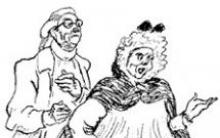
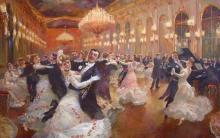
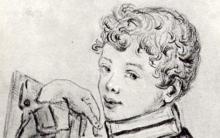
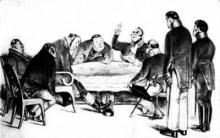
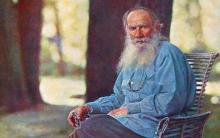




Thunderstorm characterization of the image of the boar marfa Ignatievna
The history of the creation of the "Epic of Gilgamesh"
Why is the legend of Icarus interpreted in a completely different way from the ancient Greek myth?
Heroes of Greek mythology
Ancient Greek mythology names